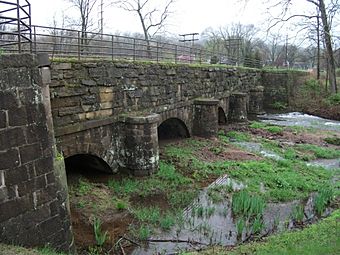Allegheny Aqueduct facts for kids
The Allegheny Aqueduct, also known as the Gibraltar Aqueduct, is a historic stone structure in Robeson Township, Berks County, Pennsylvania. It was built in 1824 and is about 260 feet (79 meters) long and 70 feet (21 meters) wide. This amazing aqueduct was a key part of the Schuylkill Canal system. Its main job was to help canal boats cross over the Allegheny Creek safely.
Contents
What is an Aqueduct?
An aqueduct is like a special bridge that carries water. In ancient times, aqueducts carried drinking water to cities. But the Allegheny Aqueduct had a different purpose. It was built to carry canal boats, which are flat-bottomed boats used for transport, across a natural waterway.
Building the Aqueduct
The Allegheny Aqueduct was built in 1824. It was designed by builders like Beecher, Ephraim, Pettitt, and Kimber. The aqueduct is supported by a strong stone arch bridge structure. This structure has five large arches, which allowed the Allegheny Creek to flow underneath.
How the Aqueduct Worked
This aqueduct was part of the Schuylkill Navigation Company canal system. Canals were like man-made rivers that helped transport goods and people. The Allegheny Aqueduct allowed canal boats to travel smoothly without having to go down into the Allegheny Creek and then back up. It was a clever way to keep the canal route level.
Its History and Importance
The Allegheny Aqueduct was in operation for a long time. It helped canal boats move across the creek until 1928. After that, canals became less common as trains and trucks took over transportation. The aqueduct was finally drained of its water in 1967.
Because of its historical importance and unique design, the Allegheny Aqueduct was added to the National Register of Historic Places in 1984. This means it's recognized as a special place that should be protected.
Gallery








